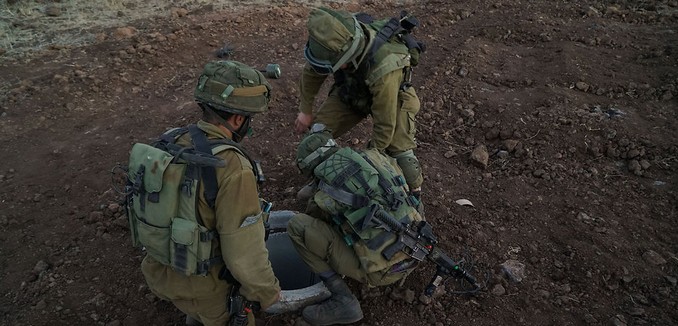The Israeli military is adapting its tactics to better prepare for a possible attack by the Iran-backed terrorist group Hezbollah, training troops in specialized ground maneuvers and equipping them with the resources necessary to counter Hezbollah’s tunnel capabilities.
One of the Israel Defense Forces’ key expectations is that Hezbollah will seek to infiltrate Israeli territory immediately after the outbreak of any future hostilities, namely to capture an Israeli town or military outpost in an effort to give the impression of a major victory, Ynet reported.
The IDF ran several brigade exercises in recent weeks to prepare for such a scenario, including by combining infantry forces with armored brigades in one simulation.
According to commanders, the scenario simulated included a force of Hezbollah fighters attempting to invade Israeli territory and the combined IDF force was to reinforce border communities, conduct ambushes at strategic points, conduct tactical deception, contain and secure the area and eliminate the enemy force.
“The enemy’s offensive capabilities have improved,” a senior IDF officer told Ynet. “Brigade commanders were defensively spread out with soldiers before they even reached the simulation area. Such a move gives flexibility to the division, which is responsible for the defense of the area and allows us to correct defensive vulnerabilities. Today, battalions realize they will immediately be playing defense regardless of fire or approval to maneuver.”
The IDF is also preparing to confront Hezbollah’s use of tunnels. While the military believes that Hezbollah’s tunnels have yet to breach Israeli territory, it assessed that “they’ve definitely built infrastructure and fighting tunnels in and around Shiite villages in southern Lebanon,” according to Ynet.
The officer explained that, in response to this potential threat, “every brigade force includes at least one engineering platoon with heavy equipment such as the D9.” The D9 is a bulldozer used in the effort to discover and destroy tunnels.
“The best way to deal with a tunnel is to neutralize it without entering it. In the north, we see anti-tank missiles as a bigger threat than tunnels,” the officer added.
Ron Ben Yishai, Ynet’s military correspondent, wrote last week that a recent strike by Israel against a military airport outside of Damascus was likely an effort to deprive Hezbollah of more accurate missiles that “could reach central and even southern Israel and threaten most of the essential facilities and civilian and military airports in the State of Israel.”
Sheikh Hassan Nasrallah, Hezbollah’s leader, admitted last June that Iran provided his terrorist group with everything it needed. “We are open about the fact that Hezbollah’s budget, its income, its expenses, everything it eats and drinks, its weapons and rockets, are from the Islamic Republic of Iran,” said Nasrallah, who insisted that the Lebanese terrorist organization “will not be affected” by new sanctions against his group. “As long as Iran has money, we have money… Just as we receive the rockets that we use to threaten Israel, we are receiving our money. No law will prevent us from receiving it,” he added.
Nasrallah’s acknowledgement of Iranian aid seems to confirm a public assurance given to him in August 2015 by Iranian Foreign Minister Mohammad Javad Zarif that the nuclear deal Iran reached with global powers presented “a historic opportunity” to confront Israel. Iran recently announced that its defense spending would increase by 90 percent in the coming year.
According to a July 2016 report published by the Foundation for Defense of Democracies, Israeli officials believe that any future war with Hezbollah has the potential to cause “thousands of civilian deaths” in Israel. Hezbollah has, among other things, threatened to attack ammonium tanks in Haifa, which could kill tens of thousands of people.
The think tank’s vice president for research, Jonathan Schanzer, explained that Hezbollah’s widely-reported tactic of hiding military assets in civilian areas would also lead to mass casualties. Reports emerged two years ago that Hezbollah was offering reduced-price housing to Shiite families who allowed the terrorist group to store rocket launchers in their homes. An Israeli defense official told The New York Times in May 2015 that the buildup of Hezbollah’s terror infrastructure in southern Lebanese villages meant that “civilians are living in a military compound” and that their lives were at risk. A few days later, a newspaper linked to Hezbollah bolstered the Israeli assessment.
[Photo: IDF Spokesperson’s Unit ]




